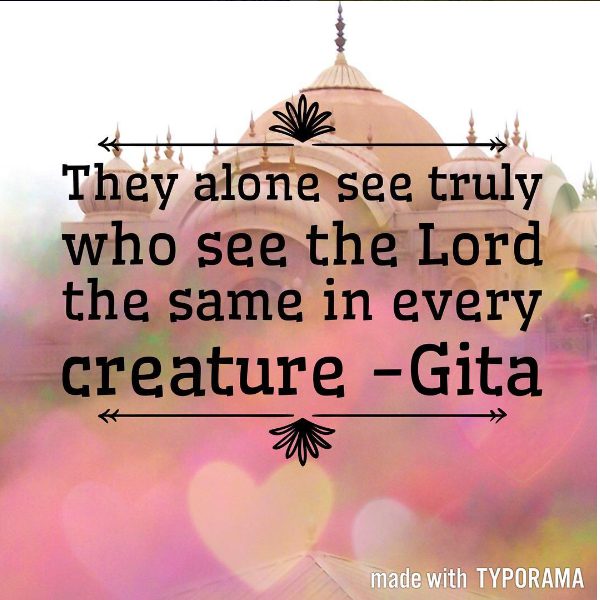We are doing a scripture study together: reading along through some scriptures and discussing the passages. Today is the tenth post of my favorite Upanishad: The Katha. This is the story of a boy who chatted with the God of death.
http://www.angelfire.com/electronic/awakening101/upani_katha.html
11
By the mind alone is Brahman to be realised; then one does not see in It any multiplicity whatsoever. He goes from death to death who sees multiplicity in It. This, verily, is That.
12
The Purusha, of the size of a thumb, dwells in the body. He is the Lord of the past and the future. After knowing Him, one does not conceal oneself any more. This, verily, is That.
13
The Purusha, of the size of a thumb, is like a flame without smoke. The Lord of the past and the future, He is the same today and tomorrow. This, verily, is That.
14
As rainwater falling on a mountain peak runs down the rocks in all directions, even so he who sees the attributes as different from Brahman verily runs after them in all directions.
15
As pure water poured into pure water becomes one with it, so also, O Gautama, does the Self of the sage who knows.
http://www.vedarahasya.net/katha-4.htm
The Purusha (or the Atma), who is of the size of one’s thumb, resides in the center of one’s body (within the cave of heart). He is the Lord for all that comes and goes. That one who knows it to be so will never worry about saving or protecting himself (since there is no second thing to be protected against – all are seen as one and the same there being no distinction).
The Purusha residing in the heart cave, who is of the size of one’s thumb is like a flame without a smoke, crystal-clear. He, who is the Lord of all that was created and those to be created, is the one present now and in the hereafter (conveying the immortality principle).
As water poured upon the mountain tops comes down in numerous branches in all sides (with increasingly lesser strength), that one who distinguishes between various dharmas (life-codes propounded by different religious doctrines) runs after each of such variants with increasingly lesser understanding and knowledge of the Self.
As pure water poured in to pure water merging and becoming one and the same, so becomes the soul of a sage who has understood the truth of the Self. (He, on identifying the true Self, and getting into it, merges with it and becomes one with it. That is the state of liberation).
Commentary (Swami Krishnananda)
All desires are due to a sense of separation from the beloved object. The longing to unite oneself with that from which one is separated is desire. The urge to come together is desire. So, when you come into union with an object, you seem to be in a state of fulfillment. But, says the Upanishad, this is not really fulfilling wants, because they rise again, like a creditor coming again and again until his dues are cleared. If they had really been fulfilled, why should desires rise again? They are not satisfied with what you give, because in a so-called enjoyment, you do not unite. The whole world cannot make you happy because you never can come into union with it, and because you fail in this, you take another birth.
…That about which even the gods have doubt, about which even the scriptures do not speak adequately, what is That—That Being which cannot be perceived, either by the eyes or any other sense-organ? He is the most hidden of all hidden secrets, the mysterious divine Being. Where is He hidden? In the jungles? In the caves? In the sky? In the forest? What a mystery! People go to different places seeking Him, but He is hidden in the bottom of the very seeker himself.
…“It is attainable by him through whom it is sought,” is Sankara’s explanation to this mantra. The seeker and the sought are the same. “One, having known that primal God deeply hidden in the cave of the heart, abandons joy and sorrow because they belong to the world of thought.”
My Thoughts
The metaphor of the streams of water coming into the one vast ocean is a popular one and I often think of it.
I find much of this Upanishad to be beautifully straight forward and precise. Because of that, I often find myself without anything to add!












